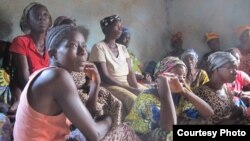The U.N. Children’s Fund is appealing for an additional $300 million to expand its fight against Ebola in the three heavily affected West African countries over the next six months. UNICEF said gaining the confidence of community members, increasing their awareness and knowledge of modes of transmission and prevention are key to winning the battle against this deadly disease.
UNICEF officials said money from the appeal would be used to tackle two major drivers of Ebola transmission: lack of early isolation of patients and unsafe burials. Both of these issues are wound up with traditional cultural practices, which often have stymied aid agencies’ efforts to prevent people from getting infected with the disease and spreading it to others.
Community involvement is absolutely essential to ending this epidemic. UNICEF's crisis communications chief, Sarah Crowe, said recent surveys indicate people gradually have been changing their behavior for the better.
"We have seen encouraging trends in the understanding, the knowledge, attitudes and perceptions that people have about safe burials, about what the triggers are of Ebola," she said. "What we now need to see is how this knowledge transfers" into action, into reducing the number of cases.
Altering behavior
Funds from the appeal would be used to promote life-saving behaviors and train 60,000 community volunteers, Crowe said.
Liberia, Sierra Leone and Guinea have closed their schools in an effort to contain the epidemic. Some schools are being used as informal quarantine centers, and the governments have not yet decided when to reopen them for education.
While UNICEF is eager to see children return to school, it says this must be done in a safe and responsible manner. This means providing schools with water and sanitation and other facilities needed to create a healthy environment.
Finding homes for children
Crowe said the appeal also will be used to provide child-protection services, since about 10,000 children across all three countries have lost one or both parents to Ebola. UNICEF is working to trace and unite these orphan children with members of their extended families. If this fails, they are placed in interim care centers.
Ebola orphans are still stigmatized and rejected by communities fearful of getting the disease, Crowe said.
But some attitudes and outcomes are changing for the better, she added. Most children taken into care by governments, UNICEF and other social welfare organizations "have been placed with extended family members. And that has been happening pretty rapidly within most of the centers, [in] around two to three weeks."
Crowe said Ebola’s rapid spread in Liberia, Sierra Leone and Guinea is largely due to their fragile health systems. To try to remedy this, she says, UNICEF will be helping to build robust primary health care and other social services in communities while engaging in the fight against Ebola.




